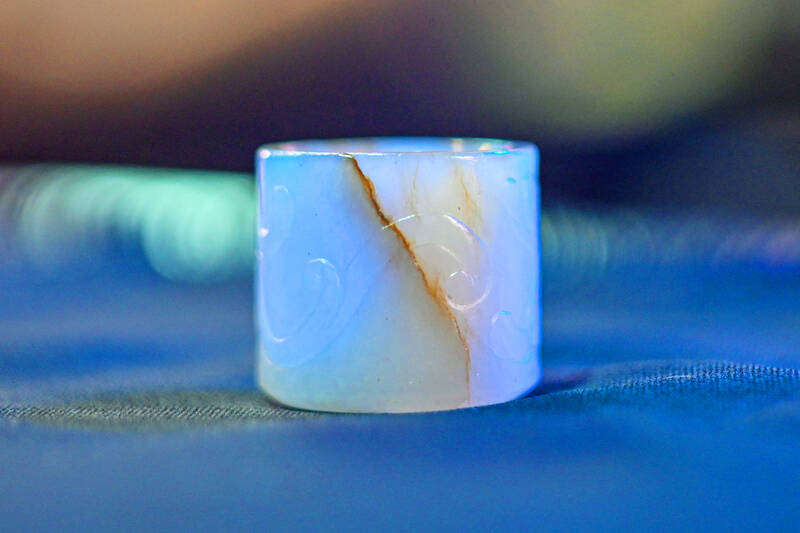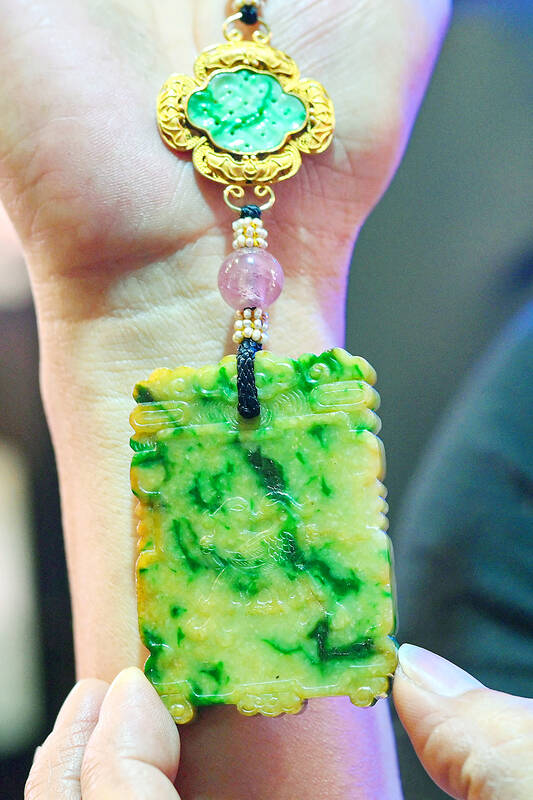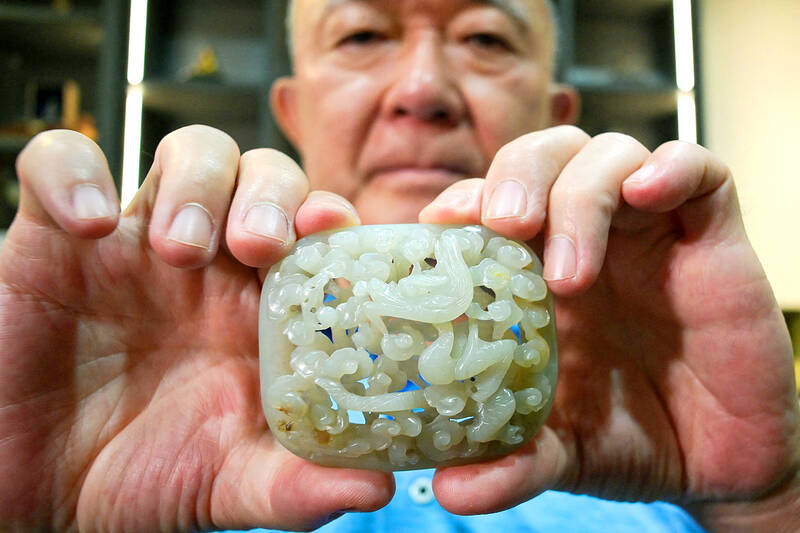Tracing a palm-sized jade pig resting on its haunches, an antique trader in Taiwan said the ears on the nearly 400-year-old piece are a marker of its authenticity.
“The folds in the pig’s ears show the handiwork, the ancient handicraft” of the Ming Dynasty (1368-1644), said the 60-year-old trader, who would only provide his last name as Lee. “It takes very careful carving. If it were duplicates, they wouldn’t make it that delicate and detailed.”
Lee’s shop in Taipei’s Daan district holds ancient treasures worth more than a condominium located in the same neighborhood. The value of his merchandise represents just a fraction of an industry that the island’s jade association says brought in nearly US$16 million annually in recorded pre-pandemic antique jade sales.

Photo: AFP
But dealers warn the sector is flagging post-COVID. With the global economy in tatters, buyers are more cautious about taking a chance on expensive items, especially with the market awash with counterfeits. Taipei’s worsening ties with Beijing have also meant restrictions are still in place for visitors from China, effectively cutting out the industry’s biggest buyers. Relations have plummeted since Taiwanese twice elected President Tsai Ing-wen (蔡英文), who refuses to accept Beijing’s claim that the self-ruled island belongs to China, was elected in 2016.
“About seven to 12 years ago, it was very good times for people in Taiwan who are in the antiques or jade trade,” said Liu San-bian, who runs a store in Metropolitan Jewelry and Antiques Emporium. “It declined when cross-strait politics slowly affected travel between both sides,” he said, summing up the dilemma in four Chinese characters meaning: “Hard to buy, hard to sell.”
“Chinese people stopped coming in and rich people in Taiwan are not buying. There is no supply in the market... and collectors here are not willing to release their items for sale.”

Photo: AFP
‘INGRAINED IN OUR DNA’
Taiwan was the go-to place for hunters of Chinese relics long before it became a powerhouse for hi-tech semiconductors. Collectors said most were carried out of China during the Cultural Revolution, ending up on the island and nearby Hong Kong.
The Chinese government generally considers the trade of antiques from historical eras to be illegal if they were not passed down through inheritance or bought from authorized venues, such as cultural relic stores.

Photo: AFP
But there is a grey area in Taiwan, where collectors say they have obtained the items through legitimate means, especially if the items were personal belongings.
“To the Chinese, it is ingrained in our DNA,” said Chang Ju-ben, chairman of Taiwan’s Association of Jade Collectors.
“Collectors in Taiwan began collecting when they realized that these were valuable national treasures... Taiwan has a reputation in the Greater Chinese community, that you can come here to see, touch and buy good jades here.”
The antique jade market took off around 2011, when Beijing-friendly Ma Ying-jeou (馬英九) was president, bringing in “an endless stream of buyers from China and other countries,” Chang said. Now Taiwan’s market is about a quarter of its former annual value — roughly US$9.4 million to US$15.7 million in the boom years — and it is easy to be steered towards inauthentic “artefacts.”
“It relies on word of mouth,” Chang said. “You have to walk the right path and find the right person.”
Most reputable collectors are also “protective” about their stock, refusing to show their best items to a novice who won’t appreciate it or to a buyer simply looking to resell for profit.
‘BUILD A REPUTATION’
A two-hour flight to Hong Kong — a hub for Chinese antiques sold in both sprawling markets and upscale auction houses — tells a different story.
Pola Antebi, deputy chairman at Christie’s auction house in Hong Kong, said she is seeing a trend in which antique collectors are releasing long-cherished collections held for up to five decades.
“We’ve sold several substantial collections from Taiwan in Hong Kong in recent years, including the notable Chang Wei-hwa collection of early jades,” Antebi said.
That portfolio of jades from the Qin and Han dynasties fetched US$9.3 million in November, while three previous auctions of Chang Wei-hwa’s collection brought in US$24.7 million from 2019 to 2021. Taiwan’s jade “players” remain confident the trade “will survive no matter what,” said the trader Lee.
His unique shop, which houses aquariums of iridescent corals, gets visitors via word of mouth. One trip can turn into several before any transaction is made — if at all.
“It takes very long to build a reputation, but it is very easy to ruin it. If one item you sell turns out to be fake... that’s all it takes to ruin you,” he said.

April 14 to April 20 In March 1947, Sising Katadrepan urged the government to drop the “high mountain people” (高山族) designation for Indigenous Taiwanese and refer to them as “Taiwan people” (台灣族). He considered the term derogatory, arguing that it made them sound like animals. The Taiwan Provincial Government agreed to stop using the term, stating that Indigenous Taiwanese suffered all sorts of discrimination and oppression under the Japanese and were forced to live in the mountains as outsiders to society. Now, under the new regime, they would be seen as equals, thus they should be henceforth

Last week, the the National Immigration Agency (NIA) told the legislature that more than 10,000 naturalized Taiwanese citizens from the People’s Republic of China (PRC) risked having their citizenship revoked if they failed to provide proof that they had renounced their Chinese household registration within the next three months. Renunciation is required under the Act Governing Relations Between the People of the Taiwan Area and the Mainland Area (臺灣地區與大陸地區人民關係條例), as amended in 2004, though it was only a legal requirement after 2000. Prior to that, it had been only an administrative requirement since the Nationality Act (國籍法) was established in

Three big changes have transformed the landscape of Taiwan’s local patronage factions: Increasing Democratic Progressive Party (DPP) involvement, rising new factions and the Chinese Nationalist Party’s (KMT) significantly weakened control. GREEN FACTIONS It is said that “south of the Zhuoshui River (濁水溪), there is no blue-green divide,” meaning that from Yunlin County south there is no difference between KMT and DPP politicians. This is not always true, but there is more than a grain of truth to it. Traditionally, DPP factions are viewed as national entities, with their primary function to secure plum positions in the party and government. This is not unusual

US President Donald Trump’s bid to take back control of the Panama Canal has put his counterpart Jose Raul Mulino in a difficult position and revived fears in the Central American country that US military bases will return. After Trump vowed to reclaim the interoceanic waterway from Chinese influence, US Defense Secretary Pete Hegseth signed an agreement with the Mulino administration last week for the US to deploy troops in areas adjacent to the canal. For more than two decades, after handing over control of the strategically vital waterway to Panama in 1999 and dismantling the bases that protected it, Washington has